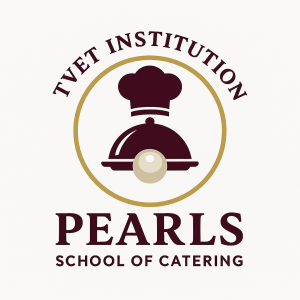Pearls School of Catering – Shaping Culinary Excellence Online
Pearls School of Catering is a premier Technical and Vocational Education and Training (TVET) institution dedicated to empowering aspiring chefs, hospitality professionals, and culinary entrepreneurs with practical, industry-relevant skills — all from the comfort of their own homes.
Through a flexible and fully online learning platform, Pearls School of Catering blends expert instruction with hands-on training approaches to ensure that every learner masters the art and science of food preparation, presentation, and management. Our courses are designed to meet national TVET standards, equipping students with the competencies needed to thrive in both local and international hospitality industries.
At Pearls, we believe that culinary education goes beyond recipes — it’s about creativity, professionalism, and excellence. Our curriculum covers a wide range of subjects including:
-
Professional Cookery & Baking
-
Food & Beverage Management
-
Catering & hospitality management
-
Nutrition & Menu Planning
-
Entrepreneurship & Small Business Management
With guidance from experienced instructors and access to interactive learning materials, our students graduate with the confidence, skills, and certification needed to turn their culinary passion into a rewarding career.
Pearls School of Catering – Where passion meets profession, and every learner becomes a culinary pearl.

